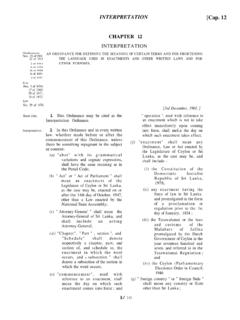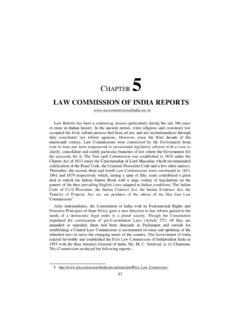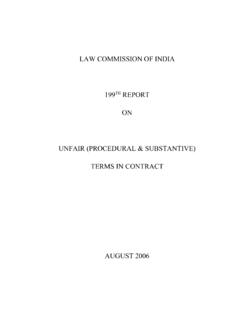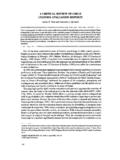Transcription of LEGAL AID IN INDIA AND THE JUDICIAL CONTRIBUTION
1 LEGAL AID IN INDIA AND THE JUDICIAL CONTRIBUTION Dr. G. Mallikarjun The concept of seeking justice cannot be equated with the value of dollars. Money plays no role in seeking justice. Justice Blackmun in Jackson v Bish Introduction LEGAL aid to the poor and weak is necessary for the preservation of rule of law which is necessary for the existence of the orderly society. Until and unless poor illiterate man is not legally assisted, he is denied equality in the opportunity to seek justice. Therefore as a step towards making the LEGAL service serve the poor and the deprived; the judiciary has taken active interest in providing LEGAL aid to the needy in the recent past.
2 The Indian Constitution provides for an independent and impartial judiciary and the courts are given power to protect the constitution and safeguard the rights of people irrespective of their financial status. Since the aim of the constitution is to provide justice to all and the directive principles are in its integral part of the constitution, the constitution dictates that judiciary has duty to protect rights of the poor as also society as a whole. The judiciary through its significant JUDICIAL interventions has compelled as well as guided the legislature to come up with the suitable legislations to bring justice to the doorsteps of the weakest sections of the society.
3 Public Interest Litigation is one shining example of how Indian judiciary has played the role of the vanguard of the rights of Indian citizens especially the poor. It encouraged the public spirited people to seek justice for the poor. For that Supreme Court relaxed procedure substantially. Apart from Public Interest Litigation and JUDICIAL activism, there are reforms in the JUDICIAL process, where it aims to make justice cheap and easy by introducing Lok Adalat system as a one of the methods to provide free LEGAL aid and speedy justice at the door steps of the poor. In this article the author highlights the importance of free LEGAL aid in a constitutional democracy like INDIA where a significant section of the population has still not seen the constitutional promises of even the very basic fundamental rights being fulfilled for them.
4 Assistant Professor (Law), NALSAR University of Law, Hyderabad. 2013] Universities, Intellectual Property Rights and Spinoffs: A critical evaluation 235 LEGAL Aid: The Concept LEGAL Aid implies giving free LEGAL services to the poor and needy who cannot afford the services of a lawyer for the conduct of a case or a LEGAL proceeding in any court, tribunal or before an authority. LEGAL Aid is the method adopted to ensure that no one is deprived of professional advice and help because of lack of funds. Therefore, the main object is to provide equal justice is to be made available to the poor, down trodden and weaker section of society.
5 In this regard Justice Bhagwati rightly observed that:1 The LEGAL aid means providing an arrangement in the society so that the missionary of administration of justice becomes easily accessible and is not out of reach of those who have to resort to it for enforcement of its given to them by law, the poor and illiterate should be able to approach the courts and their ignorance and poverty should not be an impediment in the way of their obtaining justice from the courts. LEGAL aid should be available to the poor and illiterate, who don't have access to courts. One need not be a litigant to seek aid by means of LEGAL aid.
6 Therefore, LEGAL aid is to be made available to the poor and needy by providing a system of government funding for those who cannot afford the cost of litigation. LEGAL aid strives to ensure that constitutional pledge is fulfilled in its letter and spirit and equal justice is made available to the poor, downtrodden and weaker sections of the society. It is worthy to mention that the Constitution of INDIA provides2 that State shall secure that the operation of the LEGAL system promotes justice on a basis of equal opportunity, and shall in particular, provide free LEGAL aid, by suitable legislation or schemes or in any other way, to ensure that opportunities for securing justice are not denied to any citizen by reason of economic or other disability.
7 Constitution of INDIA also makes it obligatory for the 1 Speaking through the LEGAL Aid Committee formed in 1971 by the State of Gujarat on LEGAL Aid with its Chairman, Mr. Bhagwati along with its members, Mr. Thakore, , Mr. VV Mehta, Deputy Speaker, Gujarat Vidhan Sabha, Mr. Madhavsinh F. Solanki, , Mr. Girishbhai C. Patel, Principal, New Lal College, Ahemdabad. His Lord ship answered to the question of inequality in the administration of justice between the rich and the poor. 2 Article 39A of the Indian Constitution 236 NALSAR Law Review [ : No. 1 State to ensure equality before law and a LEGAL system which promotes justice on a basis of equal opportunity to all3.]
8 Free LEGAL Aid in INDIA : The positive CONTRIBUTION of Judiciary The Supreme Court of INDIA got a major opportunity to make an emphatic pronouncement regarding the rights of the poor and indigent in judgment of Hussainara Khatoon4 where the petitioner brought to the notice of Supreme Court that most of the under trails have already under gone the punishment much more than what they would have got had they been convicted without any delay. The delay was caused due to inability of the persons involved to engage a LEGAL counsel to defend them in the court and the main reason behind their inability was their poverty. Thus, in this case the court pointed out that Article 39-Aemphasized that free LEGAL service was an inalienable element of reasonable, fair and just procedure and that the right to free LEGAL services was implicit in the guarantee of Article 21.
9 Two years later, in the case of Khatri v. State of Bihar5, the court answered the question the right to free LEGAL aid to poor or indigent accused who are incapable of engaging lawyers. It held that the state is constitutionally bound to provide such aid not only at the stage of trial but also when they are first produced before the magistrate or remanded from time to time and that such a right cannot be denied on the ground of financial constraints or administrative inability or that the accused did not ask for it. Magistrates and Sessions Judges must inform the accused of such rights. The right to free LEGAL services is an essential ingredient of reasonable, fair and just procedure for a person accused of an offence and it must be held implicit in the guarantee of Article 21 and the State is under a constitutional mandate to provide a lawyer to an accused person if the circumstances of the case and the needs of justice so State cannot avoid this obligation by pleading financial or administrative inability or that none of the aggrieved prisoners asked for any LEGAL aid.
10 In Suk Das v. Union Territory of Arunachal Pradesh6, Justice Bhagwati, emphasized the need of the creating the LEGAL awareness 3 Articles 14 and 22(1) of the Indian Constitution. 4 Hussainara Khatoon v. State of Bihar, (1980) 1 SCC 98. 5 Khatri v. State of Bihar, AIR 1981 SC 262. 6 AIR 1986 SC 991. 2013] Universities, Intellectual Property Rights and Spinoffs: A critical evaluation 237 to the poor as they do not know the their rights more particularly right to free LEGAL aid and further observed that in INDIA most of the people are living in rural areas are illiterates and are not aware of the rights conferred upon them by law.






![Cap. 158] WORKMEN'S COMPENSATION - …](/cache/preview/0/9/1/1/4/e/8/7/thumb-09114e8750d7c5b17dd1521fdcaaa046.jpg)








